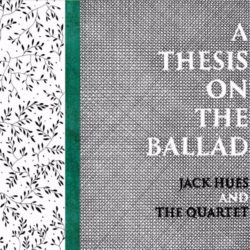
 Review Fix chats with singer/songwriter Jack Hues, known for his iconic work with ‘80s super group Wang Chung, who discusses the Jack Hues and the Quartet’s new album, “A Thesis On the Ballad,” as well as the groups creaive process and goals for the future.
Review Fix chats with singer/songwriter Jack Hues, known for his iconic work with ‘80s super group Wang Chung, who discusses the Jack Hues and the Quartet’s new album, “A Thesis On the Ballad,” as well as the groups creaive process and goals for the future.
About The Band:
Jack Hues And The Quartet grew out of evenings jamming at Jack Hues’ house in Canterbury with pianist Sam Bailey and various other musicians. They would play through Monk, Miles, Mingus, Kenny Wheeler and a select group of artists they collectively considered great. Gradually Hues started writing pieces too. The band began playing shows, playing many times at the sadly missed Orange Street Music Club in Canterbury. The band gradually evolved to a point where their friend Chris Hughes encouraged them to make an album.
Review Fix: What was the creative process of this album?
Jack Hues: Sam initially suggested my working with Kelvin. Kelvin sent me a book of his poems which lay on my piano for a few weeks. I tried setting various poems but nothing really felt compelling. Then one afternoon I read “Barbara Allan” and I could just hear the music. I sketched it out and then read the next poem in the collection – again the music came instantly and so on. In about 2 hours I wrote all six songs.Â
Working with The Quartet means creating space for improvisation so I deliberately left some sections of the songs open ended. “The Truth” is just a set of instructions to the musicians. They create the song anew every time. We performed the songs live a few times before recording them. The recordings were done in my living room in Canterbury with us all playing together. Apart from “And So” which is entirely live, I spent quite a lot of time working on the vocal overdubs. So the album is a mixture of the “jazz” aesthetic of everything live, warts and all, and the “pop” aesthetic of making the recording larger than life.Â
Review Fix: What makes the poems of Kelvin Corcoran meaningful to you?
Hues: I saw Kelvin reading at one of Sam’s wonderful Free Range events in Canterbury. His poetry uses a modern sensibility informed by deep immersion in Greek mythology, a lifetime of reading, sharing life with other poets. He is the real deal. The poems that comprise The Thesis just resonated with me. I could hear the music in them – part modern part folk part improvised part composed.Â
Review Fix: How was “An Expanse of Water” written?
Hues: I heard the tempo in the words, the rhythm, I heard C major and got the guitar riff instantly. Then I sort of imposed a song structure on to the strophic verses. It was all entirely intuitive. I just sang the song straight into my phone.Â
Review Fix: How is the sound different from Wang Chung?
Hues: It is more “real” in that the parts are all played by musicians and the idiom is acoustic, no electronics apart from some electric guitar on one song. There are no drums apart from one song – the songs are melody and harmony rather than rhythmic drive… I think my DNA is in both projects but the Quartet is undiluted!Â
Review Fix: Bottom line, why should someone check out this album?
Hues: Because it is original thinking, great playing and ultimately a real musical experience.Â
Review Fix: What’s next?
Hues: We have done two more recordings in the “Collaborations” project. One with Canterbury Rock Band Syd Arthur. This is a reworking of Beck’s “Nobody’s Fault But My Own”. The other is with 2 poets, Simon Smith and David Herd and is called “ROTE-through” and it is pretty out there!! We intend to release them both later this year. More immediately we have some gigs coming up: May 3, 4, 5 in Canterbury, Brighton and London and we hope to do lots more this summer.Â



Leave a Reply